Related Research Articles

Pentecost is a Christian holiday which takes place on the 50th day after Easter Sunday. It commemorates the descent of the Holy Spirit upon the Virgin Mary and the Apostles of Jesus Christ while they were in Jerusalem celebrating the Feast of Weeks, as described in the Acts of the Apostles.

The liturgical year, also called the church year, Christian year or kalendar, consists of the cycle of liturgical seasons in Christian churches that determines when feast days, including celebrations of saints, are to be observed, and which portions of Scripture are to be read either in an annual cycle or in a cycle of several years.

The calendar of saints is the traditional Christian method of organizing a liturgical year by associating each day with one or more saints and referring to the day as the feast day or feast of said saint. The word "feast" in this context does not mean "a large meal, typically a celebratory one", but instead "an annual religious celebration, a day dedicated to a particular saint".
In the Catholic Church, holy days of obligation are days on which the faithful are expected to attend Mass, and engage in rest from work and recreation, according to the third commandment.

The Feast of Corpus Christi, also known as the Solemnity of the Most Holy Body and Blood of Christ, is a Christian liturgical solemnity celebrating the Real Presence of the Body and Blood, Soul and Divinity of Jesus in the elements of the Eucharist; it is observed by the Latin Church, in addition to certain Western Orthodox, Lutheran, and Anglican churches. Two months earlier, the institution of the Eucharist at the Last Supper is observed on Maundy Thursday in a sombre atmosphere leading to Good Friday. The liturgy on that day also commemorates Christ's washing of the disciples' feet, the institution of the priesthood, and the agony in the Garden of Gethsemane.
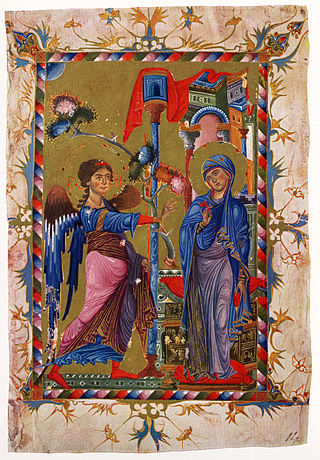
The Annunciation is, according to the Gospel of Luke, the announcement by the archangel Gabriel to Mary that she would conceive and bear a son through a virgin birth and become the mother of Jesus Christ, the Christian Messiah and Son of God, marking the Incarnation. Gabriel told Mary to name her son Jesus.
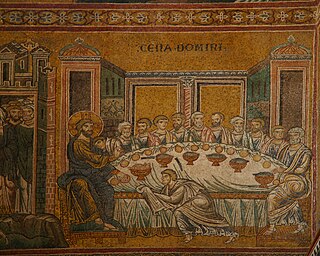
A banquet is a formal large meal where a number of people consume food together. Banquets are traditionally held to enhance the prestige of a host, or reinforce social bonds among joint contributors. Modern examples of these purposes include a charitable gathering, a ceremony, or a celebration. They often involve speeches in honor of the topic or guest of honour.

The Presentation of Jesus is an early episode in the life of Jesus Christ, describing his presentation at the Temple in Jerusalem. It is celebrated by many churches 40 days after Christmas on Candlemas, or the "Feast of the Presentation of Jesus". The episode is described in chapter 2 of the Gospel of Luke in the New Testament. Within the account, "Luke's narration of the Presentation in the Temple combines the purification rite with the Jewish ceremony of the redemption of the firstborn ."
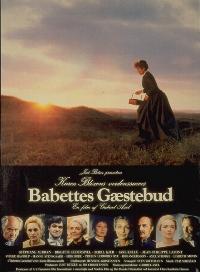
Babette's Feast is a 1987 Danish drama film directed by Gabriel Axel. The screenplay, written by Axel, was based on the 1958 story of the same name by Isak Dinesen. It was produced by Just Betzer, Bo Christensen and Benni Korzen, with funding from the Danish Film Institute. It stars Stéphane Audran, Birgitte Federspiel, and Bodil Kjer.

Epiphany, or Eid al-Ghitas, also known as "Theophany" in Eastern Christian tradition, is a Christian feast day commemorating the visit of the Magi, the baptism of Jesus, and the wedding at Cana.

In the Christian liturgical calendar, there are several different Feasts of the Cross, all of which commemorate the cross used in the crucifixion of Jesus. Unlike Good Friday, which is dedicated to the passion of Christ and the crucifixion, these feast days celebrate the cross itself, as the sign of salvation. In Western Catholicism, Eastern Catholicism, Eastern Orthodoxy, Oriental Orthodoxy, Lutheranism and Anglicanism the most common day of commemoration is 14 September, or 27 September in churches still using the Julian calendar.
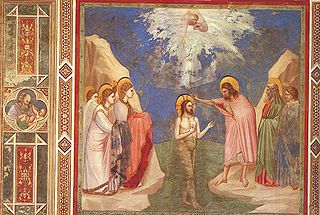
The Feast of the Baptism of the Lord, or Theophany, is the feast day commemorating the baptism of Jesus in the Jordan River by John the Baptist. Originally the baptism of Christ was celebrated on Epiphany, which commemorates the coming of the Magi, the baptism of Christ, and the wedding at Cana. Over time in the West, however, the celebration of the baptism of the Lord came to be commemorated as a distinct feast from Epiphany. It is celebrated in the Catholic Church as well as the Anglican and Lutheran Churches on the first Sunday following The Epiphany of Our Lord. Some Lutheran churches celebrate it on the Sunday before Lent, or Quinquagesima.
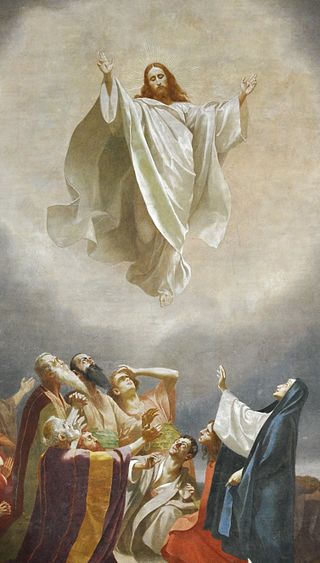
The Feast of the Ascension of Jesus Christ commemorates the Christian belief of the bodily Ascension of Jesus into Heaven. It is one of the ecumenical feasts of Christian churches, ranking with the feasts of the Passion and Pentecost. Following the account of Acts 1:3 that the risen Jesus appeared for 40 days prior to his Ascension, Ascension Day is traditionally celebrated on a Thursday, the fortieth day of Easter, although some Christian denominations have moved the observance to the following Sunday, sometimes called Ascension Sunday. The day of observance varies by ecclesiastical province in many Christian denominations, as with Methodists and Catholics, for example.
The Eastern Orthodox liturgical calendar describes and dictates the rhythm of the life of the Eastern Orthodox Church. Passages of Holy Scripture, saints and events for commemoration are associated with each date, as are many times special rules for fasting or feasting that correspond to the day of the week or time of year in relationship to the major feast days.

The Feast of Saints Peter and Paul or Solemnity of Saints Peter and Paul is a liturgical feast in honor of the martyrdom in Rome of the apostles Saint Peter and Saint Paul, which is observed on 29 June. The celebration is of ancient Christian origin, the date selected being the anniversary of either their death or the translation of their relics.
The Calendar of the Church Year is the liturgical calendar found in the 1979 Book of Common Prayer and in Lesser Feasts and Fasts, with additions made at recent General Conventions.
The Feast of the Seven Fishes is an Italian American celebration of Christmas Eve with dishes of fish and other seafood. It is not a "feast" in the sense of "holiday", but rather a grand meal. Christmas Eve is a vigil or fasting day, and the abundance of seafood reflects the observance of abstinence from meat until the feast of Christmas Day itself.
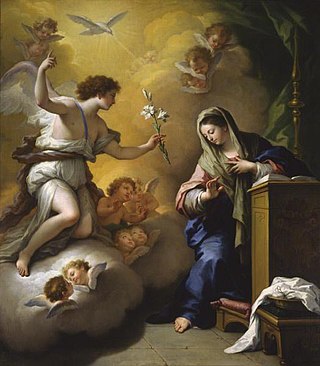
The Feast of the Annunciation commemorates the visit of the archangel Gabriel to the Virgin Mary, during which he informed her that she would be the mother of Jesus Christ, the Son of God. It is celebrated on 25 March each year. It is called in Greek Ο Ευαγγελισμός της Θεοτόκου, other names are Solemnity of the Annunciation, Lady Day, Feast of the Incarnation, and Conceptio Christi.
Lists of holidays by various categorizations.
The ranking of liturgical days in the Roman Rite is a regulation for the liturgy of the Roman Catholic church. It determines for each liturgical day which observance has priority when liturgical dates and times coincide, which texts are used for the celebration of the Holy Mass and the Liturgy of the hours and which liturgical color is assigned to the day or celebration.
References
- ↑ Transformations in Sacrificial Practices: From Antiquity to Modern Times : Proceedings of an International Colloquium, Heidelberg, 12-14, July 2006, Eftychia Stavrianopoulou, Axel Michaels, Claus Ambos, LIT Verlag Münster, 2008 page 174
- ↑ (cf. Schouten 1995)